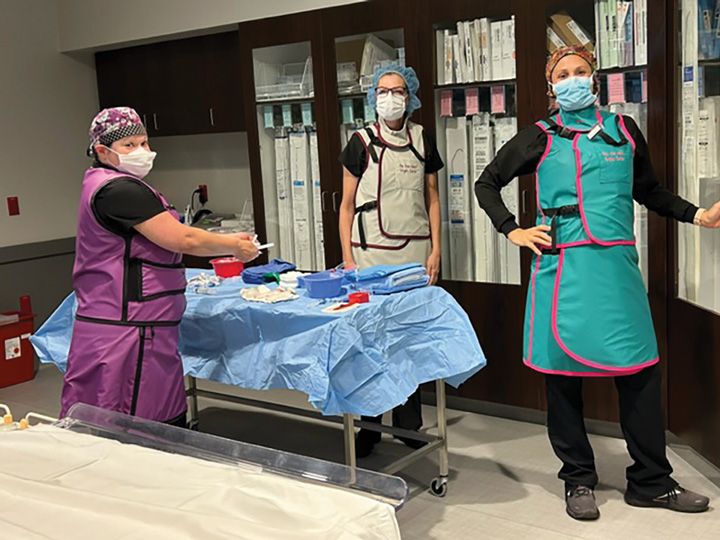- Home
- Article
OR Excellence Awards: Employee Safety: A Pioneer in the Surgical Smoke Movement
By: Danielle Bouchat-Friedman | Senior Editor
Published: 9/6/2023
Often one powerful voice can set permanent change in motion and protect employees from the harmful effects of toxic fumes.
Most surgical nurses are aware of the harmful effects of toxic fumes caused by surgical smoke, but few know when and how to lead a smoke-free movement at their facility.
Getting buy-in from your facility, including surgeons with differing opinions in a variety of specialties, can be a daunting task. But for Janelle Casanave, RN, circulating nurse at Kaiser Permanente in San Jose, Calif., it was her first pregnancy that inspired her to speak up and make a permanent change, helping the facility to become one of the first facilities nationwide to go completely surgical smoke free in the operating room. For that, Kaiser Permanente San Jose is this year’s winner of the OR Excellence Award for Employee Safety.
“I learned about the dangerous effects of surgical smoke when I first became a nurse in 2012,” says Ms. Casanave. “I found it very conflicting that nothing was being done about it.” But like so many nurses, she shied away from speaking up. “I thought well, no one else is complaining, so I don’t want to be the person questioning things. I’m a new nurse and told myself it can’t be that bad if the surgeons aren’t complaining about it.”
But Ms. Casanave changed her mind in 2017 when she became pregnant with her first child. “I decided I couldn’t expect the surgeons to lead the charge, because they aren’t in the operating room nearly as often as nurses and techs.” Her concerns were met with understanding ears and very little resistance that within four months, the hospital’s ORs were completely smoke-free.

Bay Area Heart Surgery Center, a cardiac center that opened last year in St. Petersburg, Fla., wasted no time implementing plenty of employee safety tactics.
“Our small team of seven all come from a hospital setting where there are multiple people to depend on,” says Surgery Center Director Holly Sizemore. “Here, we all take ownership and responsibility in making sure the center runs efficiently and safely,” she says. “Our entire staff even knows how to fire up the generator, if necessary,” she says.
The busy cardiac center tackles over 20 procedures a week, ranging from peripheral catheterizations and interventions to pacemaker and ICD implantations. These procedures typically require fluoroscopy, so leadership went above and beyond to keep the staff safe from radiation. Instead of supplying generic lead gowns, each team member has their own custom-made gown. “We had someone come in and measure everyone so that their gown would properly fit their body,” she says. While the custom gowns cost roughly $500 apiece, Ms. Sizemore says the cost is worth it in order to keep each staff member protected to the maximum.”
The facility also made a few design choices to help improve employee safety and comfort. “One side of our nursing station is desk level for staff who like to sit in a chair when they complete their charts. The other side is an island that is countertop height for those who prefer to stand. I have an employee with a bad back and another who is pregnant, and they both prefer to stand at a counter.”
Ms. Sizemore says the staff appreciates all the little things the facility does to help keep them safe. “They all love it here. And because they love it here, the patients love it here, too.”
—Danielle Bouchat-Friedman
She says her growing belly, along with the fact that the ORs were already equipped with new mobile fluid waste management units that came with smoke bovies that connected right to them, made going smoke-free less of a challenge. “The equipment was already accessible; it was just a matter of using it.” She says she was met with very little resistance from surgeons. “I think having the mindset that this is what we are going to do pushed staff to get on board.” Ms. Casanave says you are always going to get some pushback from those surgeons who are stuck in their ways. “We really tried to help those surgeons with ways around whatever problems they were having. And fortunately, the pencils that we already had were great, so it made the transition easier.”
In 2019, the facility earned the Gold Status award from AORN’s Go Clear Program. “Soon after, I became the West Coast Representative for Nurses Against Surgical Smoke and was one of the keynote speakers at the AORN conference in 2019 on surgical smoke safety,” says Ms. Casanave. “I also had the honor to speak at the senate hearing at the California State Capital in Sacramento in June in favor of Bill 1007, which would mandate the use of surgical smoke evacuation in operating rooms across the state.”
She is also helping promote the smoke-free movement through her involvement in Nurses Against Surgical Smoke, a community of healthcare professionals that are taking a stand against the allowance of harmful surgical smoke in the operating room. As the West Coast representative for the group, she helped put together a PSA about her experience. “I hope that our efforts will also help those within other Kaiser Permanente facilities as well as on a state level.” OSM
.svg?sfvrsn=be606e78_3)
.svg?sfvrsn=56b2f850_5)